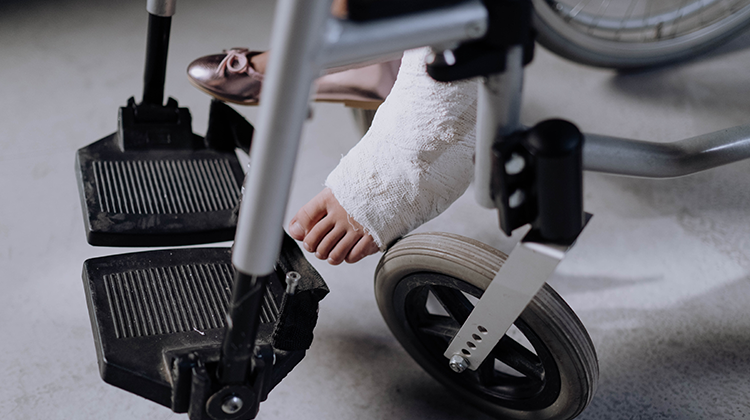In this article, we are going to practice two grammatical structures to express the result of voluntary or involuntary action.
Introduction.
Firstly, think of this sentence in English: “I broke my leg.” The literal translation in Spanish is: "Yo rompí mi pierna"
You broke your leg! Yourself! With a hammer? Oh my God! It's weird to think like that, isn't it?
In Spanish, we can express this idea in two ways depending on whether the cause of the action is voluntary or involuntary (accidental).
1 Yo rompí mi pierna (Vonluntarily. What is very crazy!)
2 (A mí) Se me rompió la pierna (Involuntarily)
Let’s go deeper.
It’s essential to focus if the cause of the action is voluntary or involuntary (accidental.)
1 Voluntary cause: We know the cause.
Grammar structure -> Sujeto personal + Verbo + algo
- Personal subject -> Yo. Tú. Él. Ella. Usted. Nosotros. Vosotros. Ellos. Ellas. Ustedes.
Yo rompí el ordenador -> (Yo) Sé la causa (p.ej.: Yo lo dejé bajo la lluvia)
I broke the computer - I know the cause (e.g.: I left it in the rain)
2 Involuntary cause (accidental): We don’t know the cause.
Grammar structural -> Se + Pronombre Objeto Indirecto + Verbo + algo
- Singular third person (always) -> Se
- We use an Indirect Object Pronoun -> Me. Te. Le. Nos. Os. Le
Se me rompió el ordenador -> (Yo) No sé la causa (puede ser un fallo interno)
I broke my computer -> I don’t know the cause (it could be an internal fault)
Note: Indirect Object Pronouns are optional however, we often use them to indicate who receives the action.
If we don´t want to mention ‘who receives the action’, we can avoid the Indirect Object Pronoun.
Se rompió el ordenador -> No sé la causa ni a quien
The computer broke down -> I don't know either the cause or whom.
Verbos.
Some pronominal verbs (i.e.: verbs that use a reflexive pronoun in their conjugation, e.g.: quemar y quemarse - to burn) can express the result of voluntary or involuntary action. These verbs are transitive, that is, they need a direct object to have meaning.
For example:
1. Daniel quemó el pollo. Daniel burned the chicken.
2. (A Daniel) Se le quemó el pollo. Daniel 's chicken got burned.
2.1 Se quemó el pollo. Chicken got burnt.
1- Daniel is the subject and responsible for the outcome of the action. Maybe he was looking at Facebook.
2- Daniel doesn't know how the dinner got burned. Maybe it was the time in the oven or the size of the chicken.
2.1- The action just happened, and we don't know who was responsible.
Another verb:
- perder/perderse - to lose.
- abrir/abrirse - to open.
- cerrar/cerrarse - to close.
- olvidar/olvidarsese - to forget.
- romper/romperse - to break.
- estropear = dañar/estropearse = dañarse - to damage.
- ensuciar/ensuciarse - to get dirty.
- complicar/complicarse - to complicate
Grammar structures. Compare!
Sujeto personal + Verbo + algo vs. Se + Pronombre Objeto Indirecto + Verbo + algo
Yo pierdo la llave - (A mí) Se me pierde la llave.
Tú pierdes las llaves - (A ti) Se te pierden las llaves.
Él. Ella. Usted pierde el pasaporte. (A Él. Ella. Usted) Se le pierde el pasaporte.
Nosotros/as perdemos los pasaportes. (A nosotros/as) Se nos pierden los pasaportes.
Vosotros/as perdeis las gafas. (A vosotros/as) Se os pierden las gafas.
Ellos. Ellas. Ustedes pierden la maleta. (A Ellos. Ellas. Ustedes) Se les pierde la maleta.
Watch out!:
- ‘Se’ no changes.
- Change the Indirect Object Pronoun: Me. Te. Le. Nos. Os. Les.
- Verb singular or plural depends on the thing or things.
Let’s practice.
Transform the sentence to express an unwitting result according to the model.
Pay attention! If the thing is singular or plural.
Please type your answers in the comments below.
Model:
(Acción voluntaria) Mi hijo ensucia la ropa -> (Involuntaria) A mi hijo se le ensucia la ropa.
1 Yo rompí las gafas -> (A mí) ... las gafas.
2 Tú cerraste la puerta -> (A ti) ... la puerta.
3 Teresa olvidó el pasaporte -> A Teresa .... el pasaporte.
4 Nosotras estropeamos el coche -> (A nosotras) .... el coche.
5 Vosotros complicásteis el trabajo -> (A vosotros) ... el trabajo.
6 Los niños rompieron sus computadoras -> A los niños ..... sus computadoras
That's all. I hope the article has helped you understand these two options in Spanish to express a voluntary and involuntary action.
Feel free to write any questions or comments below.
If you want to practice this type of case, or any other subject, in a personal class on iTalki, I am more than happy to help you.
Thanks for reading the article.
Antonio







